Finding a freshwater swimming hole without alligators living in it is already impossible in Florida.
After all, there are more than a million gators swimming and breeding in these waterways.
If you are considering moving or visiting Compass Lake, FL for recreational swimming, expect to see gators.
Alligators are everywhere in fresh water in Florida.
Learn how to swim with alligators and what to expect when you visit Compass Lake.
As it turns out, even though the lake is filled with fresh water, there are reasons why alligators and fish alike pass up the pond for somewhere more shallow.
Contents
So… Are There Alligators in Compass Lake?
Yes, there are alligators in Compass Lake in Florida.
The lake is located in Lynn Haven in Jackson County, which is close to Panama City Beach, FL.
It is also in the Panhandle of Florida, where cypress swamps make a great habitat for alligators.
According to Defenders of Wildlife, more than 1.25 million alligators live in Florida.
Compare this to only 1,000 adult crocodiles estimated to live in the Sunshine State.
The abundance of gators in the state makes it easy for these reptiles to end up living and breeding in anyone’s backyard pond or lake.
This includes Compass Lake, where the American alligator may be seen from time to time.
However, the lake itself is far too deep and dark for most fish to breed and create a habitat.
Therefore, even though Compass Lake is a freshwater habitat, alligators do not have the feeding sources of a wealth of fish that would attract them to the lake.
As a result, it is not likely that you will see an alligator swimming in Compass Lake.
But it is not impossible, so make sure to keep your senses about you what to look for if an alligator is around.
Alligators are not the only reptiles living in Compass Lake or Florida, at large.
There are plenty of snakes, as well as crocodiles, living in the state.
This is because of the warm waters, and the abundance of waterways.
Alligators and crocodiles alike can travel along rivers to new lakes as needed to find more feeding and breeding grounds.
Additionally, there are state parks in the region that support the population of alligators, namely the nearby Okefenokee Swamp in South Georgia and North Florida.
Florida, being the home to more than a million alligators, makes it easy to see why locals support the home team of the Florida Gators.
However, Louisiana is also home to this many alligators, tying these two southern states as being home to the most gators.
This has to do with the climate and the natural geology of the lake.
As long as Compass Lake lacks the proper habitat for fish, there will be a lack of alligators in the water.
Alligator Species in Compass Lake
The only alligator species in Compass Lake is the American alligator.
This is the most common alligator in the US and it dwells primarily in the South and Southeast US.
The American alligator is a standard size of an alligator with typical markings of this reptilian species.
If you were to see an alligator in Compass Lake, it would be an American alligator, 99 percent of the time.
In fact, the only way the alligator would not be an American type would be if it were actually a crocodile.
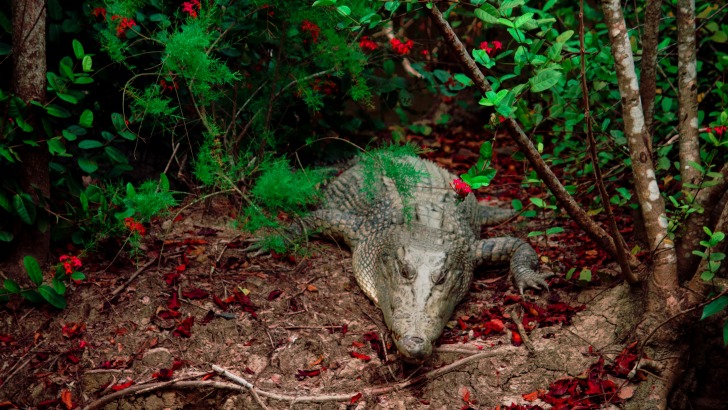
Is it Safe to Swim in Compass Lake?
Compass Lake is about 580 acres in size and rises up to 300 feet above sea level.
This is due to a natural limestone formation that sits on a ridge under the water.
The lake is fed by a spring that naturally travels into the freshwater lake.
This is a popular place to go swimming and boating, and a natural sand beach outlines most of the lake.
It is more than welcoming for swimmers who are perfectly safe on the shores and in the waters of Compass Lake.
Even with the occasional alligator, there is no reason why anyone should be afraid to swim in Compass Lake in Florida.
The lake, as explained by Lake Lubbers, is also oligotrophic.
This is due to the limestone in the basin of the lake, which reduces the water’s ability to reproduce plants.
Fish cannot spawn or feed without plants, further minimizing the activity of larger species like alligators.
However, there is a former cypress swamp that has developed into a bay of the lake.
Here the water is very deep and reaches 70 feet, making it difficult to create a healthy fish habitat.
As a result of the cypress trees and the swamp plants, the waters around the bay area are also typical local blackwater.
This is a specific type of water containing sulfur and a dark tint that alligators love to live in because they have more protection.
As someone who loves to swim, you can enjoy the sparse marine life of Compass Lake.
This also reduces the likelihood you will find alligators swimming around you in these deep waters.
Interesting Alligator Facts in Compass Lake
Whether or not an alligator was suspected, two people died from drowning in their submerged vehicle in Compass Lake, FL.
This took place in 2016 and is not suspected of an alligator’s typical activities.
In fact, there are no reports of any interesting alligator activities ever taking place in Compass Lake.
Alligators vs. Crocodiles
Are alligators and crocodiles the same? Not really, actually!
Upon first glance, it might be difficult to determine the difference between an alligator and a crocodile.
However, there are some key genetic differences that you want to know about if you are swimming in Compass Lake and think you see an alligator.
Alligators are the smaller of the two, measuring from eight to 16 feet as full-grown adults.
They tend to have dark or black-colored skin.
This reptile lays eggs that hatch into hatchlings, or baby alligators.
Alligators also have five toes on the front arms and four toes on the back legs.
However, the most common way that people can tell they are looking at an alligator is through its nose.
The snout of the alligator is shovel-shaped like a big U.
This is great for sifting through mud and river rocks when hunting prey.
Crocodiles, unlike alligators, can live in saltwater because they have saltwater glands.
Additionally, crocodiles have a lighter shade of skin, which may be because they spend time in salt water.
Saltwater builds up crystallized residue on whatever it touches.
If a crocodile lives in saltwater, that would be why they have lighter-colored skin.
Like alligators and other reptiles, crocodiles have five toes on the front legs and four toes on the back legs.
They also lay eggs, even in salt water, leading to crocodile hatchlings.
The nose of a crocodile is more pointed and sharp, sort of like the nose of a dolphin.
The smaller nose is made to look even smaller because of the wide girth of the belly of a crocodile.
These reptiles are the largest of the crocodilian species, measuring nearly 20 feet at most.
The length of the crocodile is matched by the broad belly, which looks almost comical with its smaller, thinner nose compared to the smaller, thinner alligator with its larger snout.
3 Safety Tips for Swimming in Alligator-infested Waters
- Accept that you are in alligator-infested waters before you start swimming or diving. There will be alligators if you are at Compass Lake, as there are at all the lakes in Florida. This is the natural habitat of these reptiles. Even if you are swimming in an inground swimming pool protected by a fence, there is the possibility an alligator could be lurking in the waters. That means you must be on the lookout for alligators when swimming in potentially infested waters.
- Take a safety whistle or another noise-making product. Use this to ward off any predators including alligators and snakes. This will help you “shout” for help, too, in case you are attacked by an alligator when swimming in infested waters.
- Swim with friends who are skilled swimmers, as you should be, too. When it comes to swimming in waters that have alligators, you can never be too cautious. This means having a backup buddy–or three–who can rescue you in case you get chased or bitten by a gator.
Summary
As you consider a vacation home at Compass Lake in Florida, be prepared to deal with plenty of wildlife.
This includes alligators, as well as crocodiles, which inhabit all of the waterways in the state.
There are even saltwater crocodiles in the Atlantic Ocean, right along the Florida coastline.
Learning how to swim with alligators and to live peacefully with these beasts in your backyard is the only way to survive in Compass Lake, FL.
Frequently Asked Questions
Which freshwater lake in Florida has the most alligators?
The freshwater lakes in FL with the most alligators are Lake George and Lake Kissimmee.
Lake George, with 2,300 alligators, is more than 300 miles southeast of Compass Lake, FL. Lake Kissimmee has about 2,000 alligators.
Have there been any human fatalities from an alligator attack in Compass Lake, FL?
While Compass Lake, Florida appears to be free of human fatalities caused by alligator attacks, that is not the case for other FL lakes. In fact, since the 1970s, there have been 24 people killed by gators in Florida freshwater lakes.
How far is Compass Lake, Florida from the Okefenokee Swamp?
The Okefenokee Swamp is in South Georgia, and there are 250 miles between the swamp and Compass Lake in Florida.
However, these are navigational miles directly from east to west.
In Okefenokee, there are 10,000 to 13,000 American alligators.
These are tagged and monitored and even have names, thanks to the state parks and natural resources officers.
Being that close to that many alligators makes it easy to see how gators could travel to Compass Lake by land.
If the Okefenokee Swamp Gators ran out of territory or were in need of food sources, it would make sense to travel west toward more freshwater lands like Compass Lake.
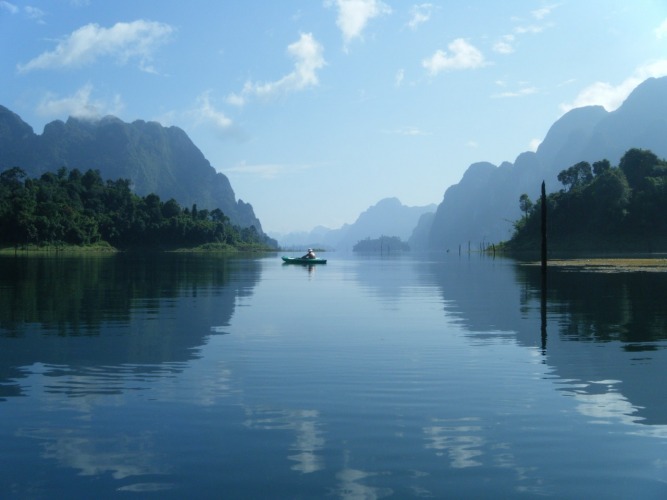
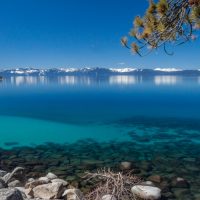
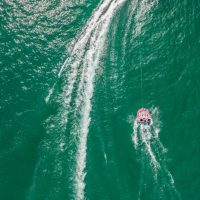


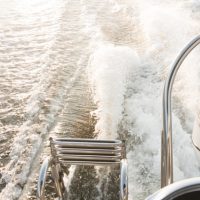
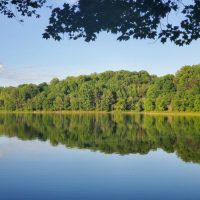





Compass Lake is a beautiful freshwater lake in Florida, but it’s important to be aware that alligators are present and precautions should be taken when swimming.